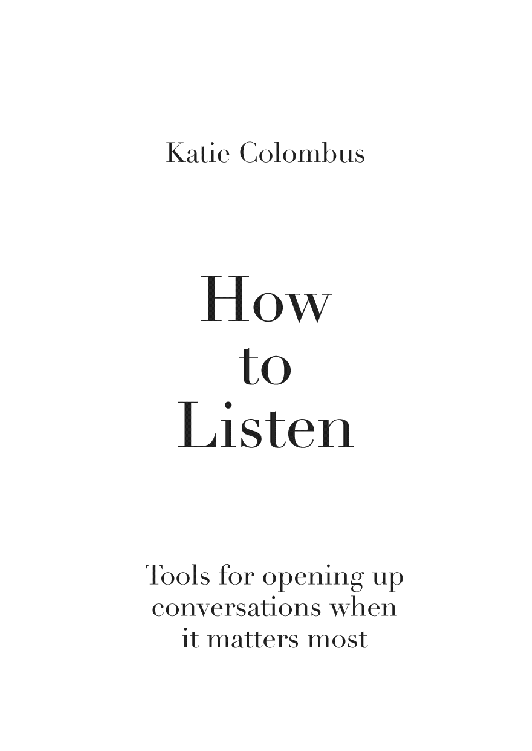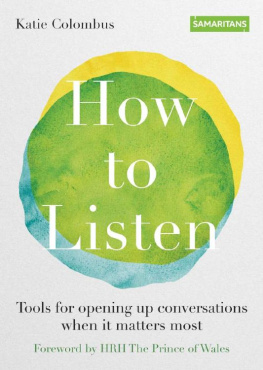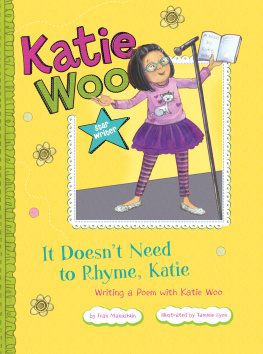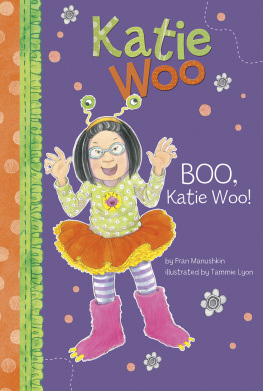Katie Colombus - How to Listen
Here you can read online Katie Colombus - How to Listen full text of the book (entire story) in english for free. Download pdf and epub, get meaning, cover and reviews about this ebook. year: 2021, publisher: Octopus, genre: Home and family. Description of the work, (preface) as well as reviews are available. Best literature library LitArk.com created for fans of good reading and offers a wide selection of genres:
Romance novel
Science fiction
Adventure
Detective
Science
History
Home and family
Prose
Art
Politics
Computer
Non-fiction
Religion
Business
Children
Humor
Choose a favorite category and find really read worthwhile books. Enjoy immersion in the world of imagination, feel the emotions of the characters or learn something new for yourself, make an fascinating discovery.
- Book:How to Listen
- Author:
- Publisher:Octopus
- Genre:
- Year:2021
- Rating:4 / 5
- Favourites:Add to favourites
- Your mark:
- 80
- 1
- 2
- 3
- 4
- 5
How to Listen: summary, description and annotation
We offer to read an annotation, description, summary or preface (depends on what the author of the book "How to Listen" wrote himself). If you haven't found the necessary information about the book — write in the comments, we will try to find it.
How to Listen — read online for free the complete book (whole text) full work
Below is the text of the book, divided by pages. System saving the place of the last page read, allows you to conveniently read the book "How to Listen" online for free, without having to search again every time where you left off. Put a bookmark, and you can go to the page where you finished reading at any time.
Font size:
Interval:
Bookmark:



Ive travelled all over the world and listening has been, for me, the most important learning tool of all. Listening doesnt just mean a few moments of polite attention before you get on to what you want to say; listening means being prepared to take the time to tune in to another life. It isnt always easy.
Listening well requires the patience to stay with someone who may not be able to articulate exactly what they are feeling, and to be able to assure whoever youre listening to that they are the most important person in your life at that moment.
A good listener knows that silence can sometimes say far more than words. A good listener is never judgemental. Be prepared for difficult, sometimes angry and ungrateful responses, but try to understand the context from which they come.
Most of all, listening requires you to forget your own ego, to set aside your own preoccupations and anxieties, and to give your full concentration to whoevers speaking to you. The rewards are that a good listener can change someones life even save someones life. And who knows? That life could be your own.
Michael Palin, Samaritans supporter
By incorporating Samaritans listening principles into your everyday life, you will be able to better recognise when those close to you need to talk, and youll have enough confidence to approach a difficult conversation. This book is a collection of stories, tips, practical exercises and guidance from listening volunteers and experts, as well as people whose lives have been changed by the power of listening, many of whom now use their experiences to help others as Samaritans volunteers, or work as clinical psychologists or in other professions where they can provide care and support. We will explore their ideas and advice, from learning about how feeling heard can provide relief, reassurance and validation, to discovering fascinating facts about brain chemistry.
We want you to listen to one another to friends, family, colleagues, partners, neighbours, whoever you like in the hope that not so many people end up feeling they have nowhere else to turn. By becoming a nation of listeners, we can work towards supporting and enhancing each others emotional wellbeing and reducing the stigma around mental health. We all have it within ourselves to listen better to those we care about. Sometimes all we need is a little confidence and reassurance in order to feel able to reach out and start a conversation about how someone might be feeling.


Why listening is important
Pause for a moment and try to remember the last time you had a really good conversation with someone. It might have been at work, at home or in the pub. It could have been with a friend, colleague or family member. It might even have been with your local coffee barista or delivery driver. But what was it that made that conversation so memorable?
Did the person give you their undivided attention? Did they look directly at you, make eye contact and make you feel seen? Did they let you speak, without interruption, not cutting in to offer advice, but rather allowing you the freedom to express whatever it was you wanted to say really making you feel heard?
Now think about another conversation youve had recently where you didnt feel so listened to. Perhaps you got the feeling that the person you were talking to was just waiting for you to finish speaking so that they could give you an opinion on what youd just said, offer some advice or tell you about a time when something like that had happened to them. Conversations like this can feel as though they are made up of two people jostling for air space each person listening for just long enough until its their turn to speak.
Most of the time, conversing is a two-way street, with a lot of give and take, so it doesnt always come naturally to us to enter a conversation with the intention of listening rather than replying. On top of this, life is full of busy distractions. It can often be difficult to feel heard. But this is why its so important to find the right time and place for listening and having a good, meaningful conversation.
At times, we all need to get something off our chests and have those long, winding conversations that end up somewhere unexpected. It might be that we need a good vent, or simply a chat to relieve boredom, lift the spirits and take our minds off the day weve had. But sometimes there could be more going on with someone, and you might feel like its time to have a deeper and more meaningful conversation, perhaps about a potentially sensitive or challenging topic. And you might worry that it wont be easy either for you, or for them.
Often, when talking to someone about their day-to-day stresses and strains, just saying Are you OK? can be enough to remind someone that you care those three little words can make a really big difference. But if someone you know well is feeling low, suffering emotional pain, going through something that feels overwhelming, complicated and distressing, or has an ongoing mental health issue, then active listening can really help. Active listening is more than just hearing somebody: it involves really concentrating on what the other person is saying and carefully considering the points they are making, without interrupting or offering your own opinion. Lending an ear with empathy, and without judgement or advice, can be the most effective means of really helping the person you are talking to. Listening to others has an extraordinary ability to make them feel validated, give them back their self-belief and empower them to change the end of their story.
It sounds so simple, doesnt it? And yet this simple act one that we are all capable of can make a huge difference to someones life. For over 65 years now, active listening is a model that has not only worked for Samaritans, but has been described by many as life-saving. We know that helping someone open up and explore their thoughts and feelings can be invaluable. Sometimes its enough in that moment to simply get everything off their chest; at other times, the conversation can be a catalyst for them to realise they need further help.
Communication is necessary for human survival
Talking and being heard is as necessary to humans as breathing, food and water. Speech is one of our first learned skills and its a key part of our interaction with others. Listening as you learn to communicate is a basic necessity. As we grow, we communicate with our parents, then friends and teachers, then colleagues and family members. The primary function of our speech is a need to be heard, to get our point across, to get the thing that we want whether were asking for an ice cream or requesting that a deadline be moved. Because of the practical nature of this primary function, it can dominate over the secondary function of speech actually being
Next pageFont size:
Interval:
Bookmark:
Similar books «How to Listen»
Look at similar books to How to Listen. We have selected literature similar in name and meaning in the hope of providing readers with more options to find new, interesting, not yet read works.
Discussion, reviews of the book How to Listen and just readers' own opinions. Leave your comments, write what you think about the work, its meaning or the main characters. Specify what exactly you liked and what you didn't like, and why you think so.













